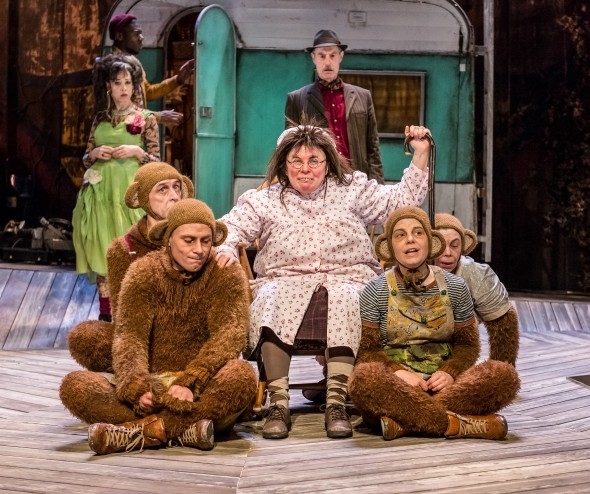Michael Coveney: Dahl takes over at the Roald Court
A new production of ”The Twits” proves a rare misfire for the Dahl catalogue

© Manuel Harlan
The thing about Dahl is that his brilliantly disgusting prose in the children's books – quite different from the smooth and elegant style of his adult fiction – is a trap for people with a hankering for nitty-gritty realism, politically incorrect bigotry dressed up as filthy fun (the safety valve syndrome) and the classic fairy tale triumph of children over grown-ups and other ogres. But in fact these stage realisations take a ride on Dahl without coming anywhere near the essence of his talent, which is in his caste of mind and his writing, just as stage adaptations of Jane Austen are invariably laughable and anodyne for the same reason.
'A kids menu in the refurbished restaurant includes a Charlie and the Chocolate Factory sundae and a BFG burger'
And another thing: who'd want any visual representation of his stories other than the drawings of Quentin Blake? Enda Walsh and the Royal Court are messing with our heads in ousting the existing physical reality of the fiction in hard and soft covers. This is less of a problem with a lesser known story, such as Esio Trot, about an old couple and a bunch of tortoises (just spotted: "Esio Trot" spells tortoise backwards) which was screened over Christmas starring Dustin Hoffman and Judi Dench. I didn't bother with it then, but I might now; I used to love the ITV screenings of Dahl's Tales of the Unexpected, which had one of the most memorable hurdy-gurdy theme tunes in television history.
In the theatre, Dahl has been mainly the province of children's playwright David Wood. Long before this current fad – and Sabine Durrant revealed in her Guardian preview that the Dahl estate had approached the Court about this project, presumably with commercial intent involving a West End transfer; doesn't sound very "Royal Court" to me – Wood had already dramatised many of the stories, including Matilda itself (which I remember reviewing in my first Observer column in 1990), The BFG (almost a rep standard now around the world), The Twits (set in a circus ring, with a brilliant wheeze to represent the world upside down: the audience put their shoes on their hands!), George's Marvellous Medicine and Fantastic Mr Fox (which misguidedly celebrates the verminous creature).
The last pre-Matilda West End Dahl was, in fact, Wood's version of The Witches starring Ruby Wax, ten years ago, and that was a disaster, too. But at least it wasn't a pretentious disaster. Wood is an expert dramatist, and he doesn't try and play Dahl at his own game but translates the stories into child-friendly theatre, using devices and ruses that properly belong to the genre. We don't need the Royal Court to rub our noses in the extremities of Dahl; he's done that already himself. And for children and adults alike, the joy of reading Dahl is the illicit nature of the pleasure he provides. It's not something to make a trendy fetish of.
It will be interesting to know what children (the Court recommends a minimum age of eight, but I saw quite a few five year-olds in the first night throng) make of The Twits. Dominic Cavendish reports in the Telegraph that his ten- and thirteen-year olds were singularly unimpressed. But Observer arts correspondent Vanessa Thorpe's eight-year-old boy was explicitly enthusiastic. This is the first Royal Court "kids" show ever staged on these hallowed boards – nursery of Osborne, Bond, Storey, Hampton, Churchill and Butterworth – outside of the Christmas season (and there's only Get Santa as any kind of precedent), and here's another RC rarity: a kids menu in the refurbished bar/restaurant that includes a Charlie and the Chocolate Factory sundae, Peach Melba, a Muggle Wump's smoothie and a BFG burger. Make mine a Peter Gill glacée with a Bill Gaskill gâteau to go.
Farewell to more critics
Two great men of arts and literature have died recently, the music critic Andrew Porter and the literary editor Ion Trewin, in whose name the Critics' Circle each year gives the best Shakespearean performance prize (this year to Antony Sher for Falstaff); Ion approached the Circle to suggest the award in memory of his drama critic parents, J C and Wendy Trewin, the former a past president of the Circle and a notable annotator of Shakespearean performance from Baliol Holloway to Peggy Ashcroft, Wendy a doughty critic in her own right on The Lady.
Porter was simply the greatest music critic of the last century – comparable only to Bernard Shaw, Ernest Newman and Desmond Shawe-Taylor – spreading his wings magnificently on the Financial Times for two decades (including some legendary reports of the Peter Brook/Ted Hughes collaborations in Shiraz) before flying to the New Yorker in the early 1970s, where his weekly essays (now collected in five hardback volumes) were a treasure trove of scholarly analysis, performance history and lucidly expressed critical appreciation. He not only knew more than anyone else, he wrote better, too. And he had absolutely no qualms about putting you right where and when you went wrong ( I benefited from this schooling when I first joined the FT; nobody does this for anyone else these days, alas) not out of spite, or vanity, but because he wanted all critical writing to be better than it was/is, and somehow half-way as good as his own.
Like all good critics, he lived dangerously. He launched a vicious attack on a Turkish soprano called Leyla Gencer, and turned up in the lobby at La Scala one night – she was singing on the stage – to discover that a man who bore an unfortunate resemblance to the great critic was being torn apart by a mob and kicked to the ground while shouting, "I'm not Andrew Porter, I'm not Andrew Porter…"












